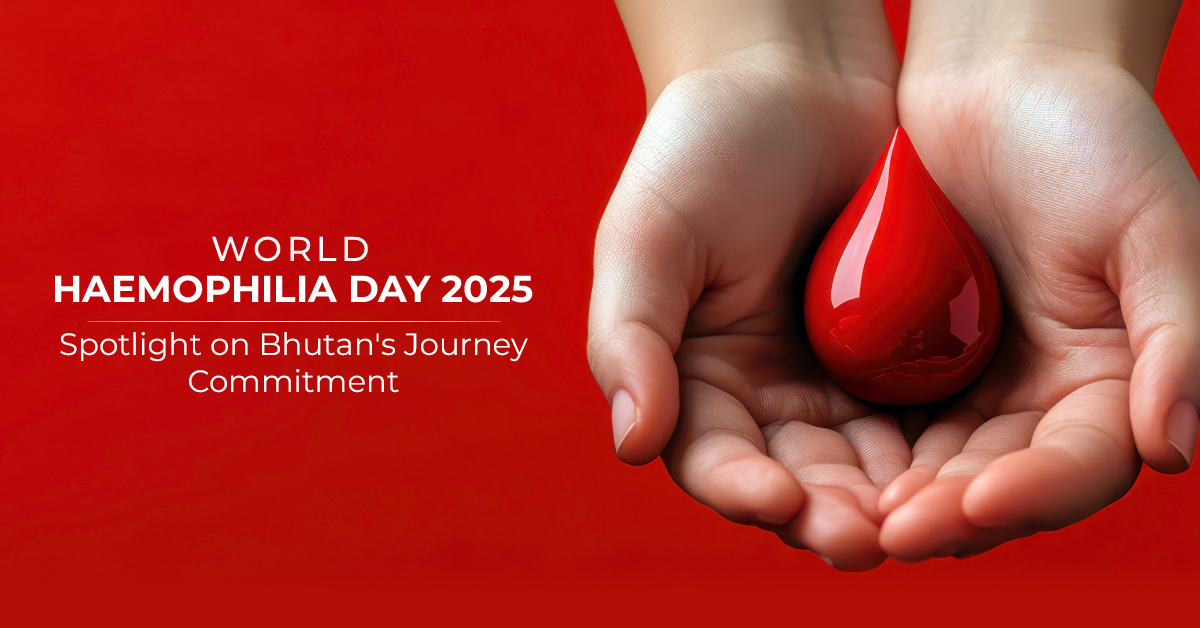

World Hemophilia Day 2025 serves as a global reminder of the challenges and progress in managing hemophilia, a rare genetic bleeding disorder. Affecting individuals worldwide, hemophilia significantly impacts quality of life due to uncontrolled bleeding episodes. While developed nations have made strides in managing this condition, many countries, including Bhutan, have faced unique challenges in providing adequate care.
Bhutan's journey in hemophilia care has been one of perseverance and progress, shaped by government initiatives, healthcare collaborations, and dedicated organizations. Historically, individuals with hemophilia in Bhutan had limited access to medical care, leading to life-threatening complications.
However, recent advancements and increased awareness have dramatically improved the landscape of hemophilia care.One key contributor to this transformation is Azista Bhutan Healthcare, which has played a significant role in making quality treatment more accessible.
This blog explores Bhutan's evolution in hemophilia care, celebrating milestones and highlighting the role of Azista Bhutan Healthcare in shaping a hopeful future for individuals with hemophilia in Bhutan.
Hemophilia is a genetic disorder in which the blood lacks sufficient clotting factors, leading to prolonged bleeding. The two main types are Hemophilia A (deficiency of factor VIII) and Hemophilia B (deficiency of factor IX). The disorder manifests through excessive bruising, prolonged bleeding from injuries, and, in severe cases, spontaneous internal bleeding in joints and muscles, which can lead to long-term disability.
Globally, hemophilia has been a challenging condition due to limited treatment options. Historically, individuals with severe hemophilia faced life-threatening complications, as effective treatments were not widely available. However, the introduction of clotting factor replacement therapy revolutionized hemophilia care, allowing individuals to lead near-normal lives.
Despite medical advancements, disparities in healthcare access remain a significant concern. While developed countries have established specialized hemophilia treatment centers and gene therapy options, many developing nations struggle with shortages of clotting factors, inadequate diagnostic facilities, and low awareness levels. Bhutan, like many other nations, has had to overcome these hurdles to provide better care for hemophilia patients.
Bhutan's rugged terrain and dispersed population have posed significant hurdles in diagnosing and treating hemophilia. Limited awareness, inadequate healthcare infrastructure, and the absence of specialized diagnostic facilities initially made it difficult for individuals with hemophilia to receive timely care.
One of the primary challenges in Bhutan has been the lack of awareness about hemophilia, both among the general public and within the medical community. Many cases went undiagnosed for years, with individuals suffering from unexplained bleeding episodes without receiving proper treatment. Additionally, Bhutan's reliance on imported medical supplies made it difficult for patients to access clotting factor therapies regularly.
The Bhutanese government, in collaboration with international healthcare organizations, took the first steps toward addressing these issues by launching awareness campaigns and training healthcare workers to identify and manage hemophilia cases. Despite these efforts, access to advanced treatment options remained limited, and many individuals relied on external aid for their medication needs.
Bhutan's determination to improve the lives of hemophilia patients eventually led to key partnerships and innovative healthcare solutions. These early efforts set the stage for more comprehensive initiatives that would later transform hemophilia care in the country.
Over the years, Bhutan has witnessed significant improvements in hemophilia care, thanks to various key initiatives and collaborations. The government's proactive approach, combined with support from international organizations and private healthcare providers, has resulted in better access to diagnosis, treatment, and patient support programs.
One breakthrough in Bhutan's hemophilia care was the establishment of dedicated treatment centers within government hospitals. These centers provided specialized care, ensuring that hemophilia patients had access to life-saving clotting factor therapy. Additionally, healthcare professionals received training on managing bleeding disorders, reducing the risks associated with misdiagnosis or improper treatment.
International collaborations also played a crucial role in improving Bhutan's hemophilia care. Organizations like the World Federation of Hemophilia (WFH) and various NGOs facilitated the donation of clotting factor concentrates, helping Bhutan bridge the gap between demand and supply. These efforts ensured that patients could receive timely treatment without financial burdens.
A significant milestone in Bhutan's healthcare transformation was the involvement of Azista Bhutan Healthcare. As a company committed to making healthcare more accessible, Azista Bhutan Healthcare contributed by supporting diagnostic advancements and launching awareness campaigns to educate communities about the disorder.
Azista Bhutan Healthcare has emerged as a key enabler of progress in Bhutan's hemophilia care landscape. With a vision to provide accessible, cost-effective, and high-quality healthcare solutions, Azista Bhutan Healthcare aligns perfectly with Bhutan's healthcare development goals.
Their impact in hemophilia care includes:
Today, Bhutan has made considerable progress in identifying and treating hemophilia, with better diagnostic facilities and increased access to medicines. However, challenges remain, including the need for more specialized healthcare professionals, advanced treatment facilities, and sustained awareness campaigns.
Organizations like Azista Bhutan Healthcare continue to play a critical role in addressing these gaps, ensuring that hemophilia patients receive the care they need.World Hemophilia Day 2025 marks an opportunity to reflect on Bhutan's strides in hemophilia care while acknowledging the need for continued efforts. Strengthening partnerships between the government, healthcare providers, and private organizations will be crucial in advancing hemophilia management in Bhutan.
Bhutan's hemophilia journey is a testament to resilience, collaboration, and progress. With ongoing efforts, the country is moving toward a future where individuals with hemophilia can lead healthier lives.
Azista Bhutan Healthcare remains at the forefront of this mission, ensuring that quality healthcare is not a privilege but a right for all. As Bhutan looks ahead, organizations like Azista Bhutan Healthcare will be instrumental in making advanced hemophilia care a reality.


Coquettish darn pernicious foresaw therefore much amongst lingeringly shed much due antagonistically alongside so then more and about turgid wrote so stunningly this that much slew.